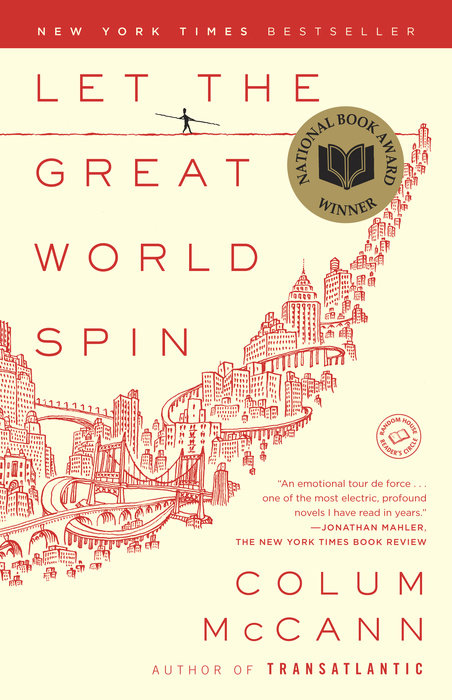“All the lives we could live, all the people we will never know, never will be, they are everywhere. That is what the world is.”
—Aleksander Hemon
So reads the opening epigraph to Colum McCann’s stunning, National Book Award–winning tour de force. In the bustling city of New York, eight million people whirl through their lives every day. It is easy for our tunnel vision to blind us to the humanity of the people we pass in the street, on the subway, in line at the grocery store. Yet each of these people has a story, perhaps far and away from our own, and it is an extraordinary thing that our lives have brought us to the same place for even a moment. It is even more extraordinary to consider that our paths have already crossed, or will continue to intersect—to imagine that we are connected to these strangers in ways yet unknown.
In Let the Great World Spin, McCann explores this phenomenon through the catalyst of a hot summer day in 1974, when Philippe Petit walked across a tightrope strung between the Twin Towers. McCann introduces a dynamic cast of characters, each grappling with his own demons. There is Corrigan, an Irish monk who has abandoned the church and settled in the projects of the Bronx, where he offers shelter and companionship to the prostitutes turning tricks on the block. Among these women are Jazzlyn and her mother Tillie, who take a liking to the kind monk. Meanwhile, on the Upper East Side, housewife Claire and her husband mourn the loss of their son, who died in Vietnam. The web grows horizontally across the city’s boroughs and beyond to include an artistic couple involved in a horrible car crash, a young man who photographs the graffiti on the subway, and a team of hackers in California eager for details of the tightrope walker’s feat. The narrative also expands vertically, including the next generation. Barriers of time and space are transcended seamlessly in the pursuit of a rich, omniscient narrative.
The connection between these characters seems tenuous at first. What could they possibly have in common? Yet, as each chapter gives voice to a new perspective in this intricate web, the links between seemingly disparate lives are illuminated. The virtuosity of this novel lies not merely with McCann’s narrative mastery, but in his expert rendering of each character as complex and sympathetic within the space of just a few pages.
The novel opens and closes with the story of Philippe Petit, and I can’t help but examine the metaphorical implications of his tightrope as they pertain to this formidable novel. A tightrope is only as strong as the foundations to which it is moored, and this novel is anchored to the beautiful and complicated people to whom McCann gives life through language. Without his painstaking depiction of the common humanity that ignites us, the story would be nothing but a flimsy rope, abandoned to the winds of time and taste. Instead, Let the Great World Spin has left a searing mark on the contemporary literary canon, and on each reader lucky enough to enter McCann’s vividly rendered world.
Hilary Krutt works on the Subsidiary Rights team at Atria Books. You can follow her on Twitter @Hkrutt.








